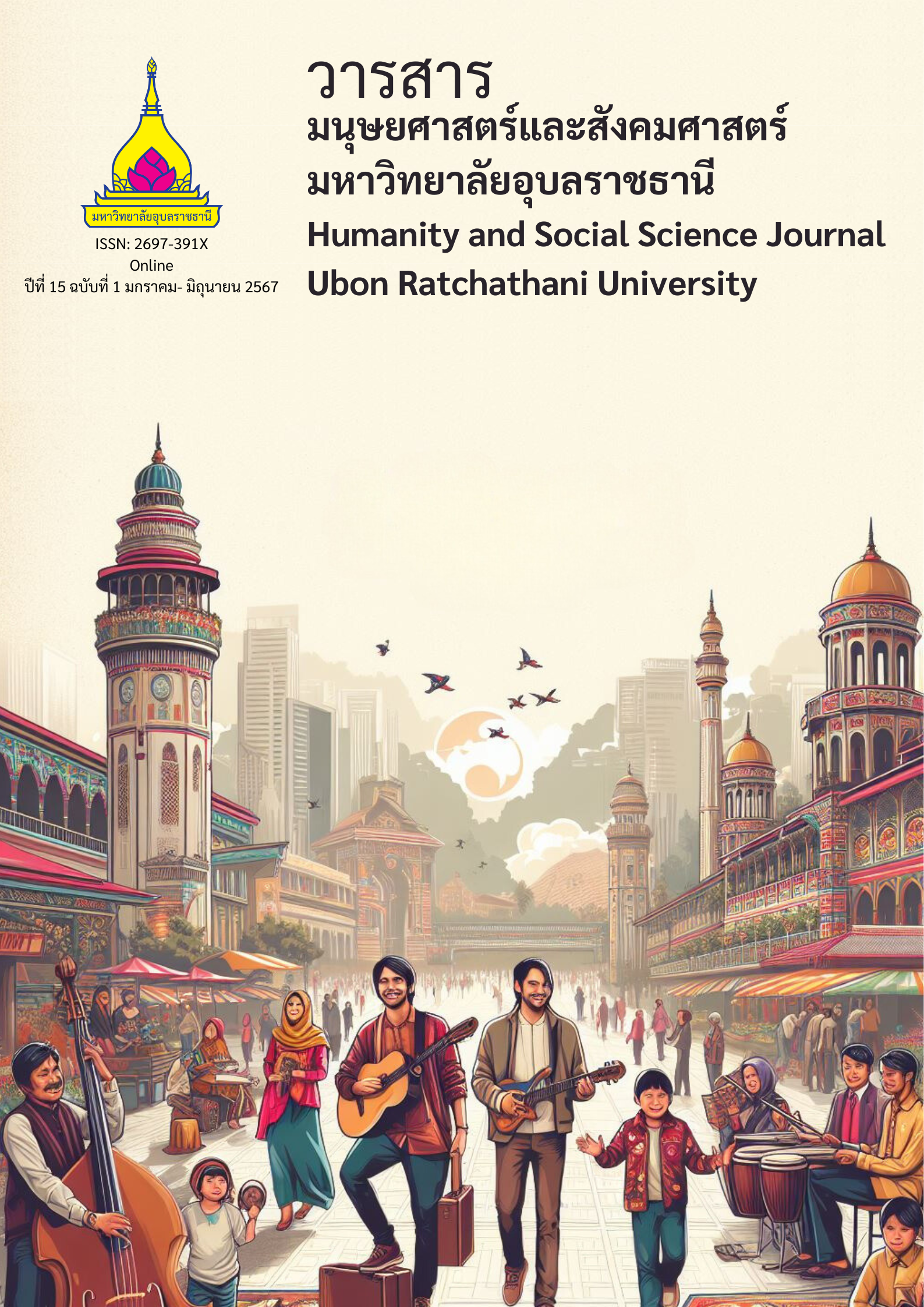การศึกษากลวิธีการตั้งชื่อภาษาจีนของละครไทย ด้วยหลักภาษาศาสตร์
Main Article Content
บทคัดย่อ
บทความวิจัยเชิงคุณภาพนี้มีวัตถุประสงค์เพื่อศึกษากลวิธีการตั้งชื่อภาษาจีนของละครไทยบนเว็บไซต์ taijuwang ตั้งแต่ปีค.ศ.2003-2022 จำนวน 2,158 ชื่อ โดยนำแนวคิดด้านภาษาศาสตร์ของหูจ้วงหลิน ผู้เชี่ยวชาญด้านทฤษฎีภาษาศาสตร์มาใช้ในการวิจัยและนำเสนอเชิงพรรณนาวิเคราะห์ ผลการวิจัยพบ 1) ด้านระบบเสียง ชื่อภาษาจีนของละครไทยนิยมใช้คำสี่พยางค์มากที่สุดและให้ความสำคัญกับสัมผัสฉันทลักษณ์ผิงเจ้อ 2) ด้านคำศัพท์ ปรากฎคำที่มีความถี่
ในการใช้สูง 3) ด้านไวยากรณ์ พบการใช้โครงสร้างวลีรูปแบบส่วนหลัก-ส่วนขยาย และโครงสร้างประโยคบอกเล่าเป็นหลัก 4) ด้านโวหาร พบการใช้รูปแบบคำพ้องเสียง อัญพจน์ ภาพพจน์แบบนามนัย และการซ้ำคำ 5) ด้านวัฒนธรรม ชื่อภาษาจีนของละครไทยสะท้อนถึงเอกลักษณ์ของวัฒนธรรมสามชาติคือ ไทย จีน และตะวันตก 6) ด้านการใช้ภาษา พบปัญหาการใช้คำไม่สุภาพ และมีความหมายคลุมเครือ ผลการวิจัยสามารถเป็นแนวทางการตั้งชื่อภาษาจีนของละครไทยในอนาคตได้ และส่งเสริมอำนาจอ่อนทางวัฒนธรรมของไทย
Article Details

อนุญาตภายใต้เงื่อนไข Creative Commons Attribution-NonCommercial-NoDerivatives 4.0 International License.
บทความที่ได้รับการตีพิมพ์เป็นลิขสิทธิ์ของวารสารมนุษยศาสตร์และสังคมศาสตร์ มหาวิทยาลัยอุบลราชธานี
ข้อความที่ปรากฏในบทความแต่ละเรื่องในวารสารวิชาการเล่มนี้เป็นความคิดเห็นส่วนตัวของผู้เขียนแต่ละท่านไม่เกี่ยวข้องกับมหาวิทยาลัยอุบลราชธานี และคณาจารย์ท่านอื่นๆในมหาวิทยาลัยฯ แต่อย่างใด ความรับผิดชอบองค์ประกอบทั้งหมดของบทความแต่ละเรื่องเป็นของผู้เขียนแต่ละท่าน หากมีความผิดพลาดใดๆ ผู้เขียนแต่ละท่านจะรับผิดชอบบทความของตนเองแต่ผู้เดียว
เอกสารอ้างอิง
Bloomfield, L. (1935). Language. London: Allen & Unwin.
Cheng, Y. F. (2014). A Comparative Study of the Translation Characteristics of Chinese and Thai Films and TV Series. [Master’s thesis, Huachiew Chalermprakiet University]. (in Thai)
Chen, Y. H. (2019, September 29) Competition between Thai and Korean versions of "My Love from the Star". Shin Min Daily News. https://www.zaobao.com.sg/zentertainment/movies-and-tv/story20190929-992993. (in China)
Chen, W. D. (1997). An Introduction to Rhetoric. Shanghai: Shanghai Century Publishing Group. (in China)
Feng, W. (2019). Behind the Thai drama fever: the reversal and 9 controversy of niche film and television dramas. Phoenix Weekly. 697, 8-25. (in China)
Gao,Y. M. (2009). A linguistic study of film titles. [Master’s thesis, Hunan Normal University]. (in China)
Hou, G. J. (2014). Seven Lexical Attributes and Their Corresponding Governing Principles. Modern Linguistics. 2, 232-243. DOI:10. 12677/ML.2014.24028
Huang, B. R. & Liao, X. D. (2022). Modern Chinese. Beijing: Higher Education Press. (in China)
Huang, G. (2015, May 21). 2014 Korean Drama in China Market Status Survey and Analysis Report. https://data.weibo.com/report/ reportDetail?id=242. (in China)
Hu, Z. L. (2013). Linguistics: A course book. Beijing: Peking University Press. (in China)
Kong, M. S. (2011). An Exploration on Thai Ghosty Movies. Journal of Yunnan Agricultural University. 6, 112-115. (in China)
Leech, G. (1981). Semantics. The study of meaning. Second edition. England: Penguin Books Ltd.
Li Lili, & Kamonchanok Sakaret. (2020). On Translation Methods of Thai TV Drama Titles in Mainland China——In Case of Youku’s Importing of Thai TV Dramas. Journal of Changchun University, 30(3), 36-40. (in China)
Niu, X. Z. & Wang, H. H. & lu, B. (Ed.) (2015). Creative media 2 (pp.61-62). Beijing: Social Sciences Academic Press. (in China)
Pinpongsub, J. (2561). The method of translating the title of Thai movies to Chinese. Veridian E-Journal, 11(3), 1471-1491. (in Thai)
Rosch, E. (1973). On the Internal Structure of Perceptual and Semantic Categories. In T. E. Moore (ed.), Cognitive Development and the Acquisition of Language (pp. 111-144). New York. Academic Press.
Saengjantanu, E. (2563). Translating Thai Drama Titles and Thai TV Series Titles into Chinese: Strategies and Analysis. Journal of Human Sciences, 21(1), 116-136. (in Thai)
Thanaratpitinan, J. (2559). Chinese Language usage in Thai Drama business culture. [Master’s thesis, Huachiew Chalermprakiet University]. (in Thai)
Wang, T. H. (2007). Exploration of the development of unique Chinese four-character forms. Journal of Beijing Vocational College of Labour and Social Security, 01, 58-60. (in China)
Wilson, D. (2003). Relevance and lexical pragmatics. Italian Journal of Linguistics, 15, 273-292.
Xing, F. Y. (2002). Three hundred questions on modern Chinese. Beijing: Commercial Press. (in China)
Yang, L. J. (2019, July 11). Remake of Thai dramas become popular only because the content is no longer “too campy”. China News. https://www.chinanews.com.cn/yl/2019/07-11/88909 39.shtml. (in China)
Ye. N. (2016). The Rhyme and Syntax Mechanism of the Modifier-and-the-Modified-Compound-Word Formation in Contemporary Chinese. Journal of Xihua University (Philosophy & Social Sciences), 35(5): 27-30,36. (in China)
Ye, F. S. & Xu, T. Q. (2010). An introduction to linguistics. Beijing: Peking University Press. (in China)
Zhan, Q. S. (2018, January 08). How to not screw up a TV remake.CCTV.com. http://news.cctv.com/2018/01/18/ARTIfl PrAxJntQ7iWq8lbwnt180118.shtml. (in China)
Zhang, Q. X. & Yu, L. L. (2016). Analysis of the spread and prospect of Thai drama in China. Contemporary TV. 10,41-42. (in China)
Zhang, R. (2011, August 31). Thai drama sparks ratings boom in China. Sina.com.cn. http://news.sina.com.cn/m/2011-08-31/170223 08335 0.shtml. (in China)


